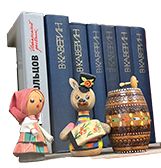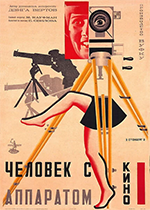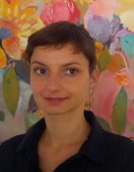The Russian Program at UC Irvine offers courses in Russian language, literature, and culture. There are over 600,000 Russian speakers in Southern California, and this Russian-speaking community includes over 150 ethnic minorities from the 15 republics of the former Soviet Union. Russian literature grapples with the fundamentals of universal truths, experiences, and qualities that transcend politics, which makes it part of world culture. Russian classes are small and students receive a great deal of personalized attention from highly motivated instructors.
We are acutely aware of the ongoing Russo-Ukrainian War. As instructors we pledge to create an atmosphere of mutual respect and tolerance in all of our Russian language and literature courses.
 |
 |
 |
 |
 |
|
Russian Library Study Hours Need a quiet place to study Russian? Want to study Russian with other students? Need a cup of tea? Come to the Russian Library study hours. |
Russian Table The weekly Russian Table is aimed at students who want to practice their Russian language skills. |
Russian Film Series This quarterly series presents Russian speaking films to help students with their language skills. Come watch a film with us! |
Russian Club The Russian Club is a student-run organization. Join them here! |
Dobro Slovo This national honor society recognizes academic excellence in the study of Slavic languages, literature, history, and culture. We accept applications each Winter quarter and hold inductions in Spring Quarter. |
The Russian Studies minor is an interdisciplinary program designed to introduce students to the rich history and culture of Russia and provide them with the intellectual and linguistic tools necessary for sustained engagement with this area of the world. Students can select courses in Political Science, History and Russian Literature and Culture. Most classes are taught in English.
Students who minor in Russian begin with an in-depth study of the Russian language. Most students start their study with Russian 1A and complete the Russian 1A-1B-1C and 2A-2B-2C sequences. Russian is the most widespread of the Slavic languages and the largest native language in Europe. Russian is the official language of Russia, and one of the official languages in Belarus, Kyrgyzstan and Kazakhstan. Russian is also considered an unofficial lingua franca in many former Soviet countries including Georgia, Latvia, Tajikistan, and Uzbekistan.
Our lower division Russian culture courses taught in English examine the rich cultural tradition of world-renowned art, literature, film, and music, but also strive to teach diverse perspectives and expose inherent imperialist currents that have been part of Russia’s history.
Upper-division courses, also taught in English, focus more in depth on one author, time period or movement. Russian literature contains mechanisms of patriarchy, expansionism, and the logic of imperialism, but also fundamentals of universal truths, experiences and qualities that transcend politics. We are also committed to teaching Russian literature in its historical context.
Requirements for the Minor
- Completion of Intermediate Russian (RUS 2C)
- Three Russian Culture courses on different topics (RUS 50)
- Four upper diversion courses on Russian literature (RUS 150), history, political science.
- A maximum of four units can be used for courses that are devoted in part to Russian themes.
If you have any questions about the Russian Minor, please contact Lora Mjolsness at lora@uci.edu
The new European Studies – Russian Major allows students to study the language, literature, history and culture of Russia while learning about how Russia fits into the European community. Since Europe is both a geographical space and an idea that changes throughout history, the study of Russia within Europe encourages an open, pluralistic and interdisciplinary approach. Students are strongly encouraged to study abroad.
There are many ways to complete this major. Here is one example for European Studies - Russian Majors.
Language Courses
Students who want to declare the European Studies Russian Major begin with an in-depth study of the Russian language. Most students start their study with Russian 1A and complete the Russian 1A-1B-1C and 2A-2B-2C sequences.
Lower Division Courses for Russian Concentration
Select two courses from Euro Studies 9, 10, 11, 12, 13
Select two different Russian 50 courses
Upper Division Courses for Russian Concentration
Select two courses from Euro Studies 100A, 100B, 100C
Select three different Russian 150 courses
Upper Division Writing Course
Complete Russian 139W

Lora Mjolsness
lora@uci.edu
View Faculty Profile
Sr. Lecturer of Russian; Director of Russian
Interests: 19th century, 20th century and Contemporary Children's Literature; Soviet and Russian Animation; Russian Folklore

Zlatina Sandalska
zlatina@uci.edu
View Faculty Profile
Lecturer of Russian
Interests: Medieval humor; parodic societies; Dovlatov; dissident literature; contemporary literature
- Russian has been designated a critical language by the United States government. Critical languages are those that are considered crucial for national security but are not spoken by enough Americans.
- Russia is waging a war against Ukraine. We need more people who study and understand the country, the language, and culture in order to help end the war.
- Russia is one of the greatest cyber threats to the United States. The Russia government engages in malicious cyber activities.
- Russian language will help you understand and enjoy Russian literature, which is crucial for understanding Russian society and communicating with its people. Russian literature has a profound effect on the structure of Russian society and it influences the daily lives of ordinary people and of its leaders.
- Russian literature engages in political, social, religious, ethical, and moral debates, but also touches on mundane everyday events. It encourages readers to think critically about what makes us human.
- Russia is the largest country of the world and has the largest new sources of natural gas and petroleum.
- Russia and the United States continue to work together on the International Space Station (ISS).
- Russian is the most widespread of the Slavic languages and the largest native language in Europe. Russian is the official language of Russia, and one of the official languages in Belarus, Kyrgyzstan, and Kazakhstan. Russian is also considered an unofficial lingua franca in many former Soviet countries including Georgia, Latvia, Tajikistan, and Uzbekistan.

